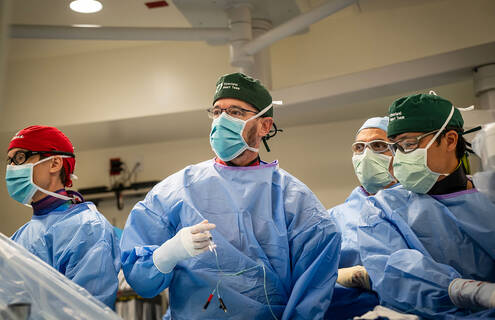
What is mitral valve regurgitation?
Mitral valve regurgitation (MR) is a cardiac condition that can impact clinical outcomes and diminish quality of life. Surgical valve repair has been an established treatment for this morbid disease. Yet, a subset of patients with severe MR are at higher risk for conventional open-heart surgery.
What is the goal of the ENCIRCLE clinical research trial?
Our participation in the ENCIRCLE clinical trial
We are one of over 60 sites nationwide and internationally participating in the ENCIRCLE clinical trial. Over the past year, we have enrolled and treated patients with the Sapient M3 implantable device.
We have completed the main enrollment phase of the trial, but we continue to participate in the Continued Access Protocol and Registry processes. These processes allow us to offer ground-breaking clinical trial research to eligible patients.
The trial aims to assess the Edwards Sapien M3 system to treat higher-risk patients diagnosed with symptomatic severe MR.
The Edwards Sapien M3 system represents a novel approach to transcatheter mitral valve replacement procedures. Successful research outcomes could translate into a significant advancement for percutaneous mitral valve therapy.
James T. DeVries, MD, an interventional cardiologist at Dartmouth Hitchcock Medical Center and Associate Professor of Medicine, Geisel School of Medicine, Dartmouth
Michael N. Young, MD, FACC, FSCAI, RPVI, interventional cardiologist and Director of the Cardiac Catheterization Laboratories and Structural Heart Disease Program at Dartmouth Hitchcock Medical Center and Assistant Professor of Medicine at the Geisel School of Medicine at Dartmouth shares,
"As leaders in heart care and clinical trials more generally understood as “research,” we are participating in innovative device trials that may help push the field forward in developing therapies for those patients with valvular heart disease who may not have other options. Positive findings could signify a major leap forward in percutaneous mitral valve therapies and have the potential to expand the armamentarium of minimally invasive options for this higher-risk patient population with limited treatment choices."